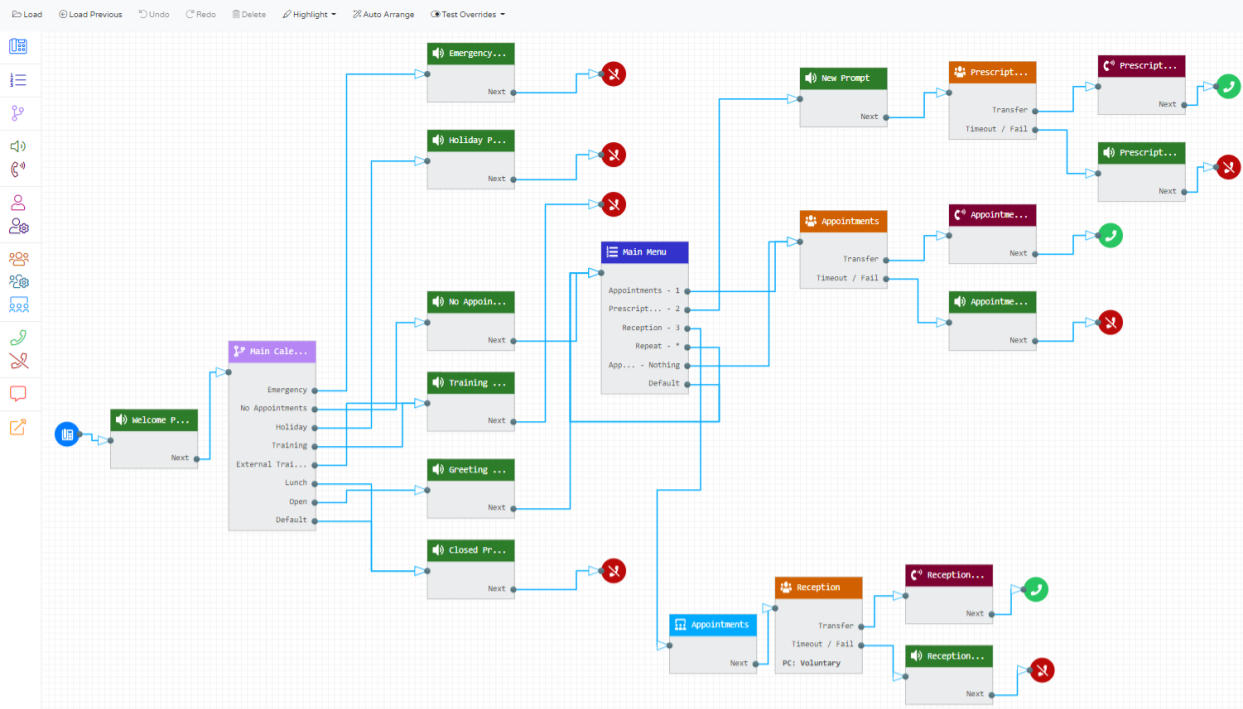In Advanced Cloud-based telephony solutions, Call Routing refers to the automated process of directing incoming calls to the appropriate department, team, or individual based on predefined criteria. In a primary care setting these criteria can include the patient’s needs, time of day, patient’s identity, or the availability of staff. Cloud-based systems, such as Surgery Connect, utilise internet-based infrastructure to manage and route calls, offering advanced features and flexibility compared to traditional telephony systems.
We all know that delivering a great patient experience is more critical than ever. To deliver modern general practice successfully, practices not only need to have the right tools in place, but they also need to know how to use them effectively. We’re here to help with that.
We believe that Call Routing is crucial to enhancing your patients’ experience, ensuring swift access to other services (where appropriate) by seamlessly redirecting to alternative pathways, such as the NHS App or Pharmacies, whilst optimising staff efficiency.
Surgery Connect is much more than a phone system; it is the backbone of delivering better patient access. Serving upwards of 3,500 surgeries across the UK gives us unparalleled insight into how to optimise access.
Call Routing with Surgery Connect
Providing patients with up-to-date information is vital for ensuring a positive patient experience. Surgery Connect makes it easy to keep messaging accurate and relevant. Well-designed call flows allow patients to be routed to the appropriate department quickly and by your own design, meaning that the telephone becomes a tool for managing access.
Our advanced call routing features save time and effort by managing opening and closing times automatically through a built-in calendar. Bespoke messaging can be created using our text-to-speech function. Unlimited phone lines and call queuing are standard, and real-time dashboards show how your surgery is performing, identifying departments that may need extra resources at specific times of the day.
With in-call communications, practices can play health notices, practice information, and relevant messages to patients waiting in the queue, along with queue position announcements and music. Informational SMS messages can direct patients to online services, reducing calls to the reception team and encouraging patients to change their behaviour. For example, patients could be redirected to the NHS App, and encouraged to access a range of NHS services that negates the need to call the practice directly.
Benefits of Advanced Call Routing
- Patient’s call reaches the best point of care for their needs in the shortest time.
- Reduces the number of calls in the main reception queue.
- Easy redirection to other ways to service patient needs, such as sending links to the NHS app or online consultation tools.
- Improved patient satisfaction as they reach the service they require quicker and easier.
Call Routing can even be personalised allowing practices to route certain callers based on their calling line identities, providing specific information or giving their call priority. This can be particularly useful for patients with frequent and repetitive needs like those requiring regular blood tests.
Case Study: Peel Hall Medical Centre in Manchester, implemented a detailed call routing strategy using our unique drag-and-drop call flow system, X-Flow, and reduced their average queue time by 77%
Effective Call Flow Design
Our e-learning course on call routing offers detailed lessons on designing effective call flows. Using a test results line as an example, we show how to stagger calls and manage demand by implementing calendars and mode switches, assigning staff to specific groups, and utilising rerouting options. This ensures a smooth and efficient experience for your patients while managing demand effectively.
Also featured in our Call Routing e-learning course are the following advanced features that offer enhanced patient experience:
- Check and Cancel: Patients can Check or Cancel appointments without speaking to a staff member, freeing up resources and reducing DNAs.
- Informational SMS: Direct patients to online services via SMS, reducing call volumes.
Continual Learning and Support
To support ongoing learning and improvement, we offer various webinars and e-learning courses. These resources are designed to enhance patient experience, improve digital access, and support key features of Surgery Connect. Certificates and CPD time are available to support personal development plans.
Looking for more great tips to get the most out of your system?
The Access Optimisation Programme supports practices in maximising the benefits of Cloud-based telephony. Aligned with the Primary Care Access Recovery Plan (PCARP), the Programme helps to transform the patient experience and helps practices manage the ‘8am rush’. It covers advanced clinical system integration, softphone usage via the phone bar, patient callback, call routing and personalised call routing. It also covers management reporting, including the eight crucial NHS key metrics.
If you want to learn more, complete the contact form on our Access Optimisation Programme web page. Whether you’re a practice, an ICB, or a PCN, we’re here to help you optimise access and enhance patient care through comprehensive training opportunities. You can commit to anything from bespoke on-site training programmes, to casual lunch-and-learn sessions for convenient staff training.
Please feel free to visit our Academy for comprehensive e-learning courses to have confidence that you are completely up to date with your systems capabilities.
Thank you for your commitment to delivering exceptional patient care.
Written by, Danielle Henderson, Regional Sales Manager

